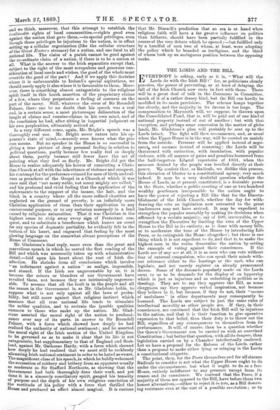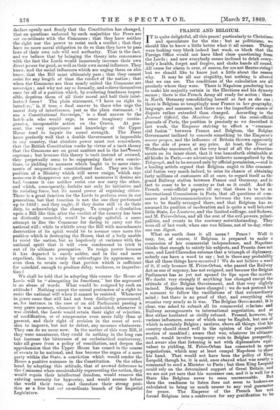THE LORDS AND THE BILL.
EVERYBODY is asking, early as it is, "What will the Lords do with the Irish Bill V" for, as politicians clearly perceive, the power of preventing, or at least of delaying, the fall of the Irish Church now rests in fact with them. There will be a great deal of talk in the Commons in Committee, much of it of a rather dreary kind, but the Bill can hardly be modified in its main provisions. The scheme hangs together too closely, and the majority in its favour is too large. The compensation to 3faynooth will, we suppose, be thrown upon the Consolidated Fund, that is, will be paid out of one kind of national property instead of out of another ; but with that exception, and perhaps some concession in the matter of glebe lands, Mr. Gladstone's plan will probably be sent up to the Lords intact. The fight will then recommence, and, as usual when the Upper House is in the way, will be carried on mainly from the outside. Pressure will be applied instead of argument* and menace instead of reasoning ; the Lords will be threatened with extinction, with inundation, with popular violence, with all manner of pains and penalties borrowed from the half-forgotten Liheral repertoire of 1831, when the measure desired by the people was levelled directly at their power. W.e confess that, as Radicals, we dislike this process, this elevation of bluster to a constitutional agency, very much indeed. It may be a very doubtful question whether the House of Lords, as at present constituted, is a desirable power in the State, whether a public meeting of one or two hundred wealthy gentlemen irresponsible to the nation ought to have the power of rejecting a Bill like that for the Disestablishment of the Irish Church, whether the day for withdrawing the veto on legislation now entrusted to the great landowners may not have arrived. It may be expedient to strengthen the popular assembly by making its decisions when affirmed by a certain majority, say of 100, irreversible, or to strengthen the Executive by limiting the veto of the Upper House to the Bill in its entirety, as is done with money bills, or to modernize the tone of the House by introducing Life Peers, or to extinguish the Housl altogether ; but there is one thing which it is not expedient to do, and that is, to make the highest men in the realm demoralize the nation by setting the example of voting against their consciences. If the Lords are of any use at all, it is as men who can vote without fear of external compulsion, who can speak their minds without reference either to the hustings or the mob, who can legislate, and not merely register an already pronounced decree. Some of the demands popularly made on the Lords seem to us to be demands for the display of an hypocrisy which is just as injurious and as enfeebling in politics as in theology. They are to say they approve the Bill, as some clergymen say they approve verbal inspiration, not because they believe in it, but because, if they do not, their "means of usefulness" in other departments may consequently be lessened. The Lords are subject to just the same rules of intellectual morality as other people are. If they, in their consciences, are convinced that the Irish Bill will be injurious to the nation, and that it is their function to give operative expression to that belief, then their duty is to throw out the
Bill, regardless of any consequences to themselves from its performance. It will, of course, then be a question whether the Queen's Government can be carried on with an unrevised Constitution ; but better that question, with all its dangers, than legislation carried on by a Chamber intellectually enslaved. Let us have a proposal for the Reform of the Lords, rather than a proposal to make either lying or cringing in the Lords a constitutional etiquette. The point, then, for the Peers themselves and for all sincere
Radicals to consider is not what the Upper House ought to do under the circumstances, but what it ought to do as a free House, entirely indifferent to any pressure except from its reason and its conscience. We contend that the Peers, if a majority of them are opposed to the Bill, have before them two honest alternatives,—either to reject it in tote, as a Bill deserving resistance even at the cost of a possible revolution ; or to declare openly and firmly that the Constitution has changed, that on questions enforced by such majorities the Peers are not co-ordinate with the Commons ; that they have neither the right nor the power to resist such a verdict ; that they have no more moral obligation to do so than they have to pass laws of their own sole will and authority. That is the fact, and we believe that by bringing the theory into consonance with the fact the Lords would immensely increase their own direct power for good, as well as their own moral influence. They know, and the social influences which are urging them on also know, that the Bill must ultimately pass ; that they cannot resist for any length of time the verdict of the nation ; that when the Commons are thus nearly united the Commons are sovereign ; and why not say so formally, and relieve themselves once for all of a position which, by rendering frankness impossible, deprives them of all their moral and half their intellectud force ? The plain statement, "I have no right to interfe re," is, if true, a final answer to those who urge the moral duty of interference, just as the plain statement, "I am a Constitutional Sovereign," is a final answer to the hot-ln ads who would urge, in some imaginary contin gencies, irresponsible action on the Crown. At present, the very experience and knowledge of the Upper House tend to impair its moral strength. The Peers know perfectly well that a double Government is impossible in any country, that absolute power must rest somewhere, that the British Constitution works by virtue of a tacit theory that the Commons are on great matters and in the laseresort supreme ; but because this theory is tacit instead of avowed, they perpetually seem to be suppressing their own convictions, or yielding to menaces which "ought to be mere statements of unquestioned constitutional fact. Thei are in the position of a Ministry which will never resign, which says measures it disapproves are good, and measures it desires are bad, Lecause it can neither resist one nor carry the other, and which, consequently, forfeits not only its initiative and its resisting force, but its moral power of regaining either. There is a great function for the Lords to perform even in our generation, but that function is not the one they performed up to 1832; and they ought, if they desire still to do their duty, to acknowledge the change. To compel a dissolution upon a Bill like this, after the verdict of the country has been so distinctly recorded, would be simply spiteful, a mere attempt to fine the Commons for daring to carry out the national will; while to whittle away the Bill with amendments destructive of its spirit would be to assume once more the position which is destroying the House, that of a body unable to resist the nation, but so hopelessly at variance with the national spirit that it will even condescend to trick it out of its ultimate prerogative. To resign power because it has departed is surely nobler, and in the end more expedient, than to retain by subterfuges its appearance, or even than to retain only that portion which is sufficient for mischief, enough to produce delay, weakness, or imperfection?
We shall be told that in adopting this course the House of Lords will be "abnegating its functions," but the argument is an abuse of words. What would be resigned by such an attitude Nothing except the unreal pretension of a right to resist the national will when it cannot be resisted. Whenever in grave cases that will had not been distinctly pronounced, as, for instance, in the case of an old Parliament passing a very grave measure, whenever it was undecided, whenever it was divided, the Lords would retain their right of rejection, of modification, or of compromise even more fully than at present, and their right of revision in the sense of revision to improve, but not to defeat, any measure whatsoever. They can do no more now. In the matter of this very Bill, if they were unanimous, they could do nothing in the long run but increase the bitterness of an ecclesiastical controversy, take all grace from a policy of conciliation, and deepen the apprehension that the Upper House has ceased in the course of events to be national, and has become the organ of a mere party within the State, a conviction which would render the House a positive nuisance in the Constitution. On the other hand, by adopting this attitude, that of avowed deference to the Commons when unmistakably representing the nation, they would regain their intellectual freedom, would remove the existing necessity for hypocrisy, and would assume before the world their true, and therefore their strong position as a free but not co-ordinate branch of the Imperial Legislature.



































 Previous page
Previous page